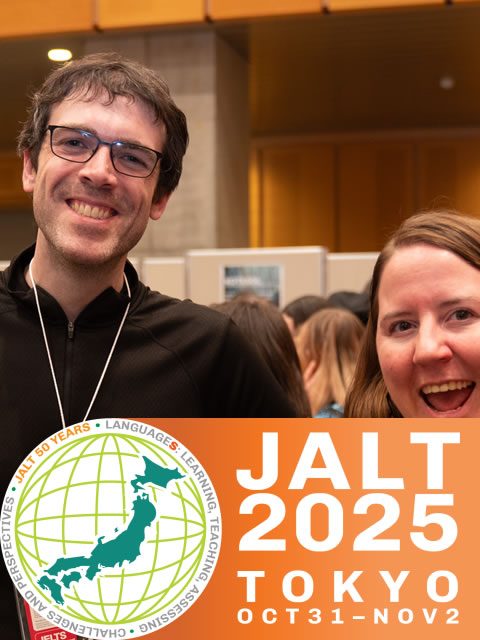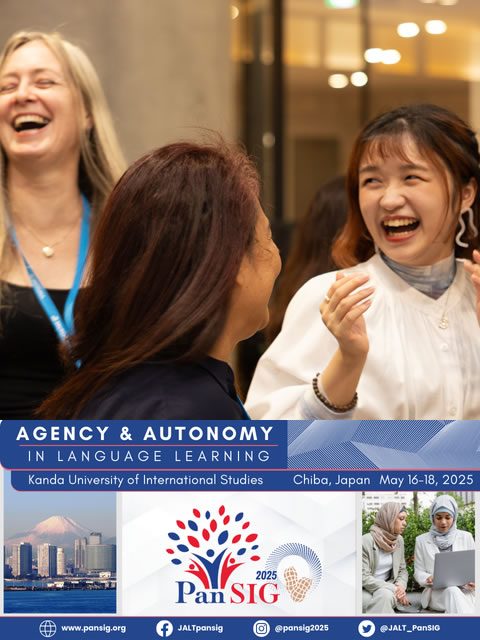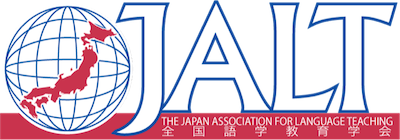Your cart is currently empty!
Featured Speaker Workshops
•
Featured Speaker
Our Featured Speakers will be running the workshops listed below, and will be taking part in numerous other sessions throughout the conference. See the conference schedule for links to their other presentations.
Please note that the Featured Speaker Workshops on Saturday and Sunday are limited to 40 participants each. Registration for these workshops is through the sponsors. Please drop by the sponsoring organization’s booth in the EME for further information and to get a ticket to attend one of these workshops.
Jeanette Littlemore
David Barker
Marcos Benevides
Kaz Hagiwara
Anna Baltzer
Leslie Anne Hendra
Laurel Kamada
Michael Swan
Nancy Douglas
Jeanette Littlemore
Metaphor, gesture and second language acquisition
Sponsored by Language Teaching Professionals
Saturday, 11:20 am – 12:50 pm
Languages vary in the ways in which they use metaphor and gesture. In this presentation we will explore the ways in which an increased attention to metaphor and gesture can contribute to successful language learning and communication.Jeanette Littlemore is a Senior Lecturer in the Centre for English Language Studies at the University of Birmingham where she teaches on the MA and PhD programs in TEFL and Applied Linguistics. Her research interests lie in the acquisition and use of figurative language by second language learners. Her publications include Figurative Thinking and Foreign Language Learning, and Applying Cognitive Linguistics to Second Language Learning and Teaching.
David Barker
The art of error analysis
Sponsored by englishbooks.jp
Saturday, 11:20 am – 12:50 pm
In this workshop, participants will analyze a range of errors commonly made by Japanese learners of English. Rather than simply looking at correction techniques, the aim will be to dig a little deeper and try to identify underlying causes of the most common errors. Participants will then work with each other and the facilitator to develop explanations that will help students to learn from their mistakes in ways that encourage them to use language creatively.David Barker has been teaching English since 1992. He has taught in England, Singapore, New Zealand, and Japan. He is the author of four Japanese language books on the subject of learner errors, and he has written many columns and articles on this topic for publications such as ALC’s English Journal and the Japan Times Shukan ST. He is currently working on developing language teaching materials that provide L1 support for Japanese learners. He has a PhD from Leeds Metropolitan University.
Marcos Benevides
Designing a themed task-based syllabus
Sponsored by ABAX
Saturday, 1:50 pm – 3:20 pm
There are many advantages to themed syllabuses for L2 instruction: the natural recycling of core vocabulary and language forms; the inclusion and scaffolding of otherwise inaccessible content; the possibility for a rapid increase in task complexity; the engaging exploration of a specific subject matter; the creation of relatively authentic L2 spaces for FL contexts. Based on his experience in materials development, the speaker will demonstrate how themed syllabuses can be developed for any teaching level.Marcos Benevides is an assistant professor in the English Language Program at J. F. Oberlin University. In recent years, he has been actively involved in ELT materials design, having co-authored two critically acclaimed themed coursebooks, Fiction in Action: Whodunit (ABAX, 2010) and Widgets: A task-based course in practical English (Pearson, 2008). He has presented widely as a featured or plenary speaker at conferences throughout Asia. His other recent interests include narrow reading, ELT teacher development, and literature in the EFL classroom. He (sometimes) maintains a blog on task-based teaching at http://widgets-hq.com.
Kaz Hagiwara
Suggestopedia: Creativity in language teaching and beyond
Sponsored by JALT Hokkaido
Saturday, 1:50 pm – 3:20 pm
Developing creativity through teaching is a demanding task. This presentation will address the difficulties in developing student creativity in the language classroom, using Suggestopedia to provide answers to the challenges of handling diverse creative domains in learning groups. It will look at how Suggestopedia considers creativity in the process of achieving its goal, and how it systematically incorporates creative elements and factors to overcome difficulties caused by the domain-specific nature of creativity.Kaz Hagiwara is a Lecturer at Griffith University in Brisbane, Australia. He has taught Japanese for over 20 years in universities in New Zealand and Australia. He met Georgi Lozanov in 1989 and became certified as a teacher/teacher-trainer in his method in 1998. Kaz has been a board member of the Lozanov International Trainers Association (LITA) since its foundation in 2006. He is the author of his own web site, Suggestopedia and Accelerative Language Teaching/Learning the Links. Suggestopedia has related articles in Wikipedia (Japan), and in the forthcoming Encyclopedia of the Sciences of Learning (Springer Science + Business Media).
Anna Baltzer
Thinking outside the box: Education and action for social justice
Sponsored by JALT Global Issues in Language Education SIG, the JALT College and University Educators SIG, and Gunma JALT
Sunday, 9:15 am – 10:45 am
For global language teachers, “thinking outside the box” means addressing world issues and considering our social responsibility as educators. In this featured speaker workshop, US-based educator and organizer Anna Baltzer will describe her background as a Fulbright scholar in the Middle East, her transformation from EFL teacher to peace activist, and her thoughts on how teachers can promote peace with justice and empower students to become active agents of the changes they seek.Anna Baltzer is a Columbia University graduate, a former EFL teacher and Fulbright scholar, a granddaughter of Holocaust refugees, and an award-winning lecturer, author and activist for Palestinian human rights. She has appeared on television more than 100 times (including The Daily Show with Jon Stewart) and has lectured at more than 400 universities, schools, churches, mosques and synagogues around the world. She is the author of Witness in Palestine: A Jewish American Woman in the Occupied Territories, and recipient of the Rachel Corrie Peace and Justice Award. She is sponsored by JALT’s Global Issues SIG and Gunma JALT Chapter.
Leslie Anne Hendra
Speaking strategies—dealing with the unpredictable
Sponsored by Cambridge University Press
Sunday, 9:15 am – 10:45 am
Speaking strategies (compensation strategies) address the real life, immediate needs of learners, enabling them to cope confidently and creatively with unpredictable situations when they suddenly find themselves lacking linguistic ability or knowledge. Strategies can include managing a discussion, giving yourself time to think, checking and summarizing information and so on. We will look at how to: select goals for different levels of competence; choose natural, high-frequency language; create useful contexts, and develop interesting practice activities.Leslie Anne Hendra is co-author of English Unlimited, a six-level course for adults, which features a page devoted to speaking strategies in every second unit and covers additional speaking strategies in the main material.
Laurel Kamada
Discourse analysis/ethnic identity outside the box
Sponsored by JALT Bilingualism and Gender and Language Education SIGs
Sunday, 12:20 pm – 1:50 pm
This participatory workshop introduces the basics of poststructuralist discourse analysis through examining the presenter’s research on mixed-ethnic (‘half/double’) girls in Japan. Macro-discourse analytic techniques include identifying discourses (ideological perspectives) by searching the data for: words repeatedly occurring, commonly emerging themes, and links/contradictions apparent in interactions. Micro-linguistic analysis includes examining lexes used; indexing of certain words; grammatical features (tense, pronouns, agency); intertextual voices; pragmatic features (speech acts). Finally, participants will ‘think outside the box’ to analyze discourse.Laurel Kamada, Senior Lecturer at Tohoku University (Applied Linguistics PhD), will be a Featured Speaker at JALT2010, sponsored by both the Bilingualism and Gender and Language Education SIGs. Her publications include: bi-/multiculturalism, bi-/multilingualism in Japan; gender and ethnic studies; marginalized (hybrid and gendered) identities in Japan; ethnic embodiment and masculinity discourses; and theoretical/methodological discourse analytic approaches. She serves on the editorial board of Japan Journal of Multilingualism and Multiculturalism and is on the Advisory Council of the International Gender and Language Association. Her most recent book is entitled: Hybrid Identities and Adolescent Girls: Being ‘Half’ in Japan (Multilingual Matters, 2010).
Michael Swan
What exactly is grammar?
Sponsored by Oxford University Press
Sunday, 12:20 pm – 1:50 pm
We all know what grammar is—until somebody asks us. Typical dictionary definitions such as “rules for changing the form of words and combining them into sentences” are not very illuminating. To understand exactly what grammar is and – crucially – why languages need it, it helps to examine how much can be communicated without it. Experimentation will show that one can actually get a long way with vocabulary alone. There are in fact only a very few essential elements of communication that are impossible without grammar – for instance the signalling of causal and other relationships. Grammar is a small number of devices which, by supplementing vocabulary, enable the expression of these essential elements. The enormous complexity of natural language arises because these devices, once in existence, can be extended and exploited for many purposes beyond those for which they are truly necessary.Michael Swan, sponsored by Oxford University Press, is a writer specializing in English language teaching and reference materials. His OUP publications include Practical English Usage, How English Works and The Good Grammar Book. He is also co-author of the Cambridge English Course series. His most recent books are Grammar (Oxford Introductions to Language Study) and Grammar Scan, a collection of diagnostic language tests written in collaboration with David Baker. Michael’s interests include pedagogic grammar, mother-tongue influence in second language acquisition, and the relationship between applied linguistic theory and classroom language-teaching practice. He wrote the foreword for the 8th edition of the Oxford Advanced Learner’s Dictionary.
Nancy Douglas
How can we link our classroom with the outside world?
Sponsored by Cengage Learning
Sunday, 12:20 pm – 1:50 pm
From the university student who uses online social media to the business person who references a company wiki, technology can motivate us to collaborate, to create, and to disseminate information across communities. How can we harness technology to unlock our students’ creativity and enhance classroom instruction? Join us as we review the latest ideas for integrating wikis, computer-based role-plays, online social media, and more into our lessons.Nancy Douglas is a materials writer and editor. She has extensive experience working with students from around the world including Mexico, Brazil, Japan, Taiwan, Germany, Russia, and Korea. Nancy’s contributions include a leading role in the development of course curricula such as work on one of the earliest online platforms for language learning, ESP courses for the health care industry, and EAP courses for students entering institutes of higher education. Nancy is a published author of ELT texts including a fluency-based course and a cross-cultural and cross-curricular reading course. Her materials development work includes online professional development programs.

JALT2025 International Conference
2025年10月31日(金)〜2025年11月02日(日) 東京都渋谷 国立オリンピック記念青少年総合センター Friday, October 31 – Sunday, November 02, 2025 • National Olympics Youth Memorial Center, Tokyo, Japan

PanSIG Conference
PanSIG 2025 will be held May 16-18 in Chiba. PanSIG is an annual conference organized by JALT’s Special Interest Groups (SIGs).
